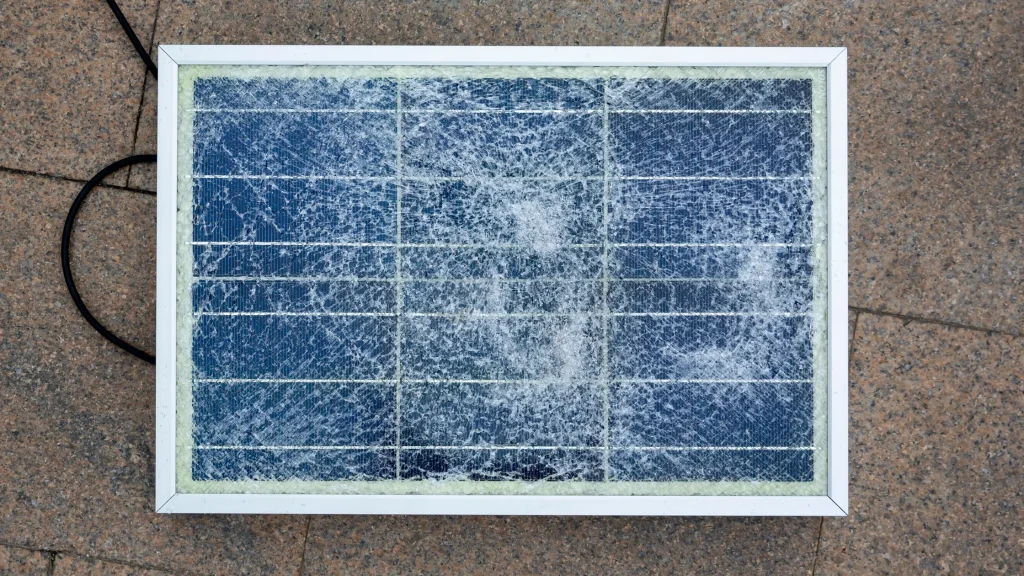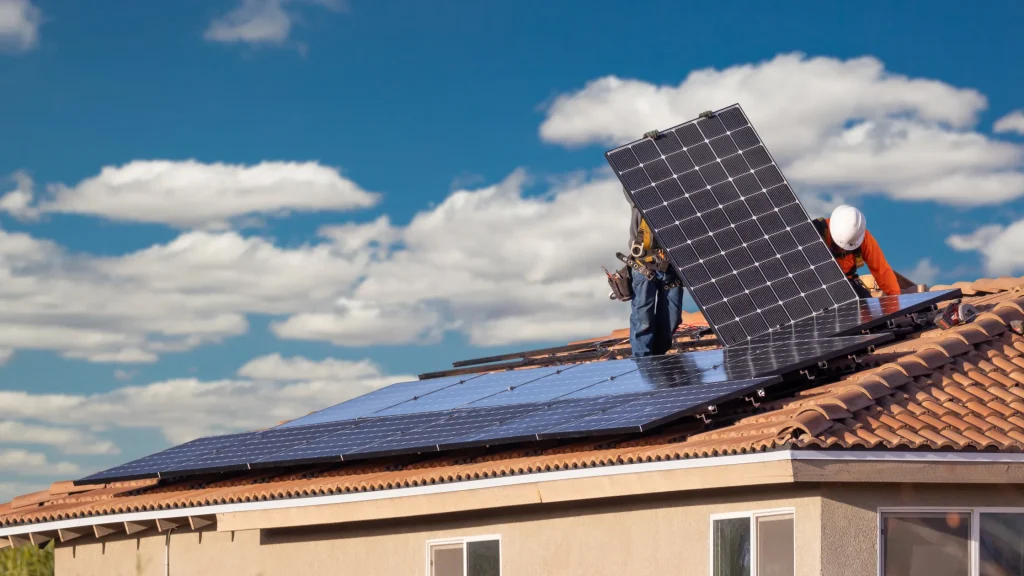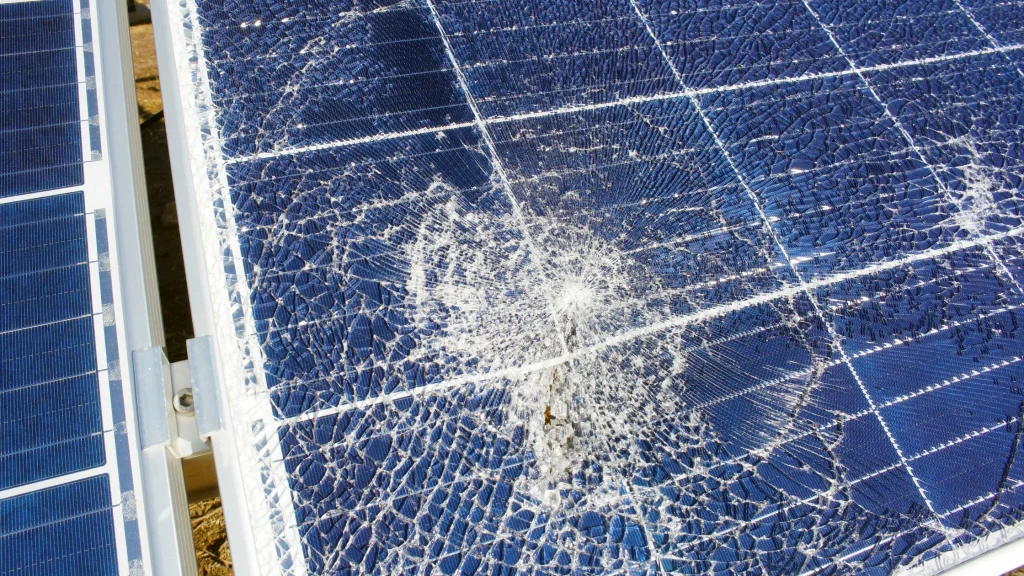Solar panels have become a popular solution for renewable energy. These panels can last over 25 years, providing clean energy to homes and businesses. However, they are not indestructible. Damaging a solar panel can reduce efficiency and even stop it from working.
Understanding how to care for your panels and what to do if they break can help you maintain their performance and protect your investment.
How Do Solar Panels Get Damaged?

Solar panels are durable, but certain factors can cause damage. Here are the most common reasons:
1. Physical Damage from Falling Objects
One of the most common reasons for damage is physical impact. Hail, tree branches, and debris from storms can hit the panel’s surface and cause cracks or scratches. Even a golf ball or rock can damage a solar panel’s tempered glass, reducing the panel’s ability to generate power.
2. Microcracks and Thermal Stress
Over time, solar panels expand and contract due to temperature changes. This sudden temperature shift can cause small cracks called microcracks. These cracks worsen over time, affecting the photovoltaic cells inside the panel and leading to degradation.
3. Poor Handling During Installation
Improper installation or mishandling during transport may cause damage to the panel’s frame. Solar installations must be done carefully to avoid bending or flexing the panels.
4. Water Damage from Aging Seals
Over time, the seals on the edges of the panels may break down. This allows water to seep in, causing water damage and internal corrosion.
What Happens If a Solar Panel Breaks?

When a solar panel breaks, its performance decreases significantly. Let’s look at what might happen:
1. Decrease in Power Output
A damaged panel won’t be able to produce as much energy as before. Even if just a part of the panel is damaged, the entire panel may not work efficiently. This leads to lower energy production and higher energy bills.
2. Panel May Still Work
In some cases, the damaged solar panel may still work but at a reduced capacity. For example, if minor scratches or a cell is broken, the panel might still generate power but not at its full potential.
3. Potential for Severe Damage
The damage could spread if the panel has broken glass or water has seeped in. This may cause environmental damage or require replacing the panel altogether.
Can a Broken Solar Panel Be Repaired?
1. Minor Repairs
If the damage is minor, like scratches on the surface, it might be possible to repair the solar cell or glass. Repairs can cost anywhere from £77 to £460, depending on the amount of damage.
2. Replacement for Severe Damage
When the extent of the damage is beyond repair, you might need to replace the panel. Replacing one panel typically costs around £702. A warranty covering your panels may help reduce repair or replacement costs.
How to Identify Solar Panel Damage

1. Monitor Power Output
Keep an eye on your power output using monitoring software or an inverter. If you notice a drop in energy production, a solar panel might be damaged.
2. Look for Visible Signs
Check the surface of your solar panels for cracks, scratches, or discoloration. These are clear signs of damage to the solar panel.
3. Check for Subtle Issues
Sometimes, the damage may not be apparent. A professional inspection can only identify microcracks or internal issues within the panel.
Steps to Take When Your Solar Panel Breaks
If you have a broken or damaged solar panel, follow these steps:
1. Contact Your Installer
Reach out to the company that installed your panels. They can inspect the damage and determine whether you need repairs or a replacement.
2. Check Your Warranty
Many solar panels come with warranties that cover certain types of breakage. Review your solar panel warranties to see if repairs or replacements are covered.
3. Recycle the Broken Panel
If the panel is beyond repair, don’t throw it in the trash. Panels contain toxic materials, so recycling them is the best way to prevent environmental damage.
Preventing Solar Panel Damage
Taking care of your panels can help you avoid costly repairs. Here are some tips:
1. Clean Your Panels
Keep your panels clean by removing dirt, dust, and debris. Cleaning at least once every two years is one of the best ways to prevent damage.
2. Trim Nearby Trees
Overhanging branches can fall and cause damage. Trimming trees near your panels will help protect them from falling objects.
3. Routine Inspections
Schedule regular maintenance to catch small issues before they worsen over time. Routine checks can help spot physical damage or microcracks early.
4. Choose High-Quality Panels
Invest in durable panels like monocrystalline panels, which are less likely to break down quickly.
Environmental Considerations for Broken Panels
1. Recycling Damaged Panels
Solar panels contain hazardous materials like lead and silicon, so they must be disposed of properly. Take your damaged panels to a recycling facility to avoid environmental damage.
2. Legal Requirements
In some areas, installers are required to recycle damaged panels. Check with your installer to ensure compliance.
Also Read: How Many Solar Panels to Achieve 4.863kW? Unlock the Secret!
What to Know About Overloading Your Solar Panels
Sometimes, damage occurs not because of external impacts but because of improper usage.
1. What Happens When Panels Are Overloaded?
Overloading occurs when your panels produce more power than the system can handle. This may cause overheating, which leads to fire hazards and damage to the electrical components.
2. How to Avoid Overloading
Ensure your system is sized correctly. Quality PV panels and installing protective devices can help manage loads and prevent issues.
Maintaining the Longevity of Your Solar Panels
Taking care of your solar panels is essential for maintaining their performance and longevity. Whether it’s cleaning, regular inspections, or professional repairs, small steps can go a long way in preventing damage. If your solar panel breaks, act quickly to avoid further problems. By following these tips, you can keep your panels running efficiently and continue enjoying the benefits of solar power.
